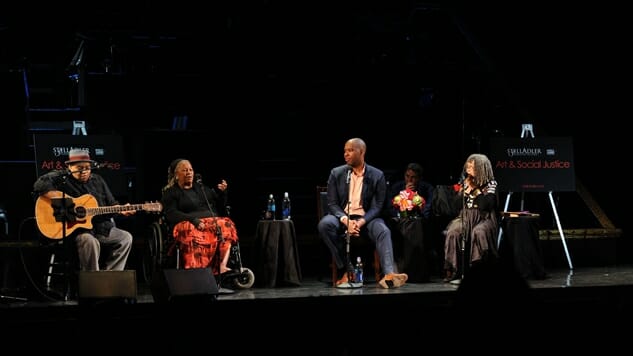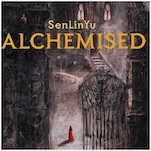Don’t Wait Until Next February To Get Into These Amazing Black Writers and Artists
Photo by Craig Barritt/Getty
If there’s anything the last month of Trump news has taught us, it’s that our country needs more than just one month devoted to black history. Black History Decade might be a good start. From the President of the United States apparently not being sure of who Frederick Douglass was, to his ridiculous suggestion that an African American reporter should reach out to the Congressional Black Caucus for him, it’s clear that dedicating the shortest month of the year to celebrating black history in America just doesn’t cut it.
So while the official Black History Month is coming to a close, our focus on amplifying marginalized voices and stories certainly shouldn’t end. Whether you think our nation’s fraught racial history has nothing to do with you (it does), or you understand all too well how the ripples of past laws and actions still reverberate against our bodies, we can only benefit from learning and sharing more.
I have plenty to say about social justice, but my voice is not one that needs to be broadcast right now. Instead, I’d like to guide you to some of the best and most impactful work by black creators that I have read, seen or heard in the last year. Not all of them are Americans, but they have all given us content that is critical to understanding American culture and politics. If you have as much to learn as I still do, these might inform your worldview as much as they informed, expanded and changed mine.
Between the World and Me
Ta-Nehisi Coates
While this book isn’t new anymore, it is essential. It does not apologize for its harsh critiques of American whiteness, or soften its language to accommodate the uninitiated. It is a brutal and damning work, and it fundamentally changed the way I see our country. Coates delivers his prose in the form of a letter to his fifteen-year old son, and in his opening lines makes it clear that he will not hold his son’s, nor the reader’s, hand.
“I am writing to you because this was the year you saw Eric Garner choked to death for selling cigarettes; because you know now that Renisha McBride was shot for seeking help, that John Crawford was shot down for browsing in a department store. … And you know now, if you did not before, that the police departments of your country have been endowed with the authority to destroy your body.”
Americanah
Chimamanda Ngozi Adichie
Adichie is right up alongside Coates as one of my favorite writers of our time—maybe ever. Her 2012 TEDx talk, “We Should All Be Feminists,” helped launch her to international acclaim (plus, being sampled in a Beyoncé song didn’t hurt), and Americanah (also not new, but something I happened to read last year) was an instant critical success. Through consistently stunning and lovely prose, the book offers a Nigerian woman’s perspective on gender and race in the United States, throwing some of our centuries-old problems into an illuminating and unflattering light. The book’s main character, Ifemelu, writes a popular blog where she writes with less poetry than Adichie, cutting right through to some of the central conflicts that the broader narrative deals with.
“Dear Non-American Black,” (Ifemelu writes in one post), “when you make the choice to come to America, you become black. Stop arguing. Stop saying I’m Jamaican or I’m Ghanaian. America doesn’t care. So what if you weren’t black in your country? You’re in America now.”
BET Humanitarian Award Acceptance Speech
Jesse Williams
It can be easy to forget that actors, with all their wealth and beauty, suffer the same prejudices and setbacks of everyday Americans. Jesse Williams is not about to let you forget, though. He’s been a vocal activist and advocate for Black Lives Matter for the past few years, and does not apologize for the intersections of his art and politics. His BET speech from this summer wasn’t just important: it was poetic and hypnotic, and worthy of repeating for its form as much as its content.
“We’re done watching and waiting while this invention called ‘whiteness’ uses and abuses us, burying black people out of sight and out of mind while extracting our culture, our dollars, our entertainment, like oil—black gold. Ghettoizing and demeaning our creations and stealing them. Gentrifying our genius and then trying us on like costumes, before discarding our bodies like rinds of strange fruit.”
How White People Can Support People of Color Now
Hannah Giorgis
After the election I, too, felt helpless against what felt like a tidal wave of hatred and intolerance that seemed to engulf a country we thought was better than this. Everyone had their traumas to deal with in the aftermath, but Giorgis reminded those of us with certain privileges that our time would be better spent helping the more vulnerable than asking them to commiserate with us.
“Emotional labor is exhausting, and people of color are already carrying the burden of existing as targets in this openly hostile terrain. The last thing we are equipped to do under duress is take on the weight of your anxieties too.”
Why “The Walking Dead” Has Become Fanfiction’s Muse
Bim Adewunmi
This is just one of dozens of Adewunmi’s killer articles from this year—it simply happens to be one of my favorites because I wrote my undergraduate thesis on fanfiction. You know what I forgot to include in that thesis, though? Non-white characters! (Vulcans don’t exactly constitute diversity.) Adewunmi discusses the relationship between representation on screen and the fan-made materials lurking in the nerdy corners of the internet, and her love for the subject shines through in every paragraph.
“Whether or not fanfic has influenced the mainstream depictions of certain characters, that so many black women are choosing to create work in the space is an interesting phenomenon in itself. These black women are finally getting to write the stories they’ve wanted to see for years.”
Adewunmi also covered the Dylann Roof trial for Buzzfeed. Her stories and tweets detailing the proceedings are worth a read.
Asked where he got his ideas on race, Roof replied, “It’s pretty much just the internet. All the information is there for you.” #RoofTrial
— Bim Adewunmi (@bimadew) December 9, 2016
The Uses of the Classical
Doreen St. Félix
Doreen St. Félix wrote probably 25 percent of my favorite reads this year. She’s so good that she can make opera seem interesting—as she did to great effect in her January essay on the Trump Inauguration headliner, young opera singer Jackie Evancho. In discussions of race, it’s important to turn the lens around and examine those whose privilege allows them to operate without scrutiny. Whiteness is not the manifest focus of this essay, but its presence is consistent throughout St. Félix’s breathless analysis of fascism, appropriation, revisionist history and, yes, opera.
“The racialized contrast between Evancho and the last two famous singers to perform at presidential inaugurations—Aretha Franklin and Beyoncé, respectively—is implied in more than skin. Evancho, the blonde and slight and earnest teenage girl who will become the first person to sing in Trump’s America, could wash the first ceremony of the new regime in purity.”
Coconut Oil
Lizzo
My favorite musical discovery this year, far and away, was Lizzo. She’s got a voice that rivals Adele’s in its power and control, and approaches Beyoncé’s in its fervor and range. Coconut Oil—a six-track EP—is her first major label release, and it’s infectious and delightful and impossible to listen to while just sitting still. Most importantly, though, the entire record revolves around the theme of self-love and acceptance. Lizzo relishes her appearance, her femininity, and her blackness in every line. Like most of the works above, I know that this EP was not made for me or other white girls, but that doesn’t make me want to share it with the world any less.
You know you a star, you can touch the sky
I know that it’s hard but you have to try
If you need advice, let me simplify:
If he don’t love you anymore
Just walk your fine ass out the door
—”Good as Hell”







































